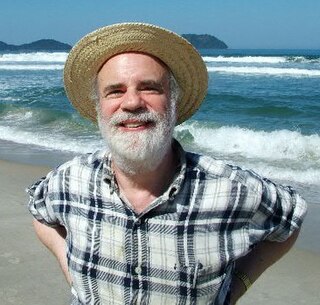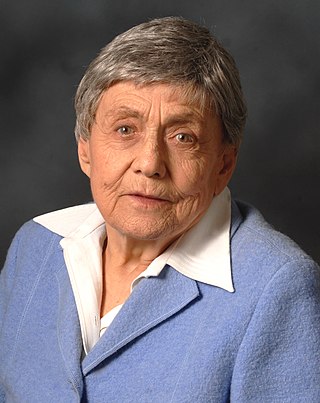
In mathematical logic, Russell's paradox is a set-theoretic paradox published by the British philosopher and mathematician Bertrand Russell in 1901. Russell's paradox shows that every set theory that contains an unrestricted comprehension principle leads to contradictions. The paradox had already been discovered independently in 1899 by the German mathematician Ernst Zermelo. However, Zermelo did not publish the idea, which remained known only to David Hilbert, Edmund Husserl, and other academics at the University of Göttingen. At the end of the 1890s, Georg Cantor – considered the founder of modern set theory – had already realized that his theory would lead to a contradiction, as he told Hilbert and Richard Dedekind by letter.

Saul Aaron Kripke was an American analytic philosopher and logician. He was Distinguished Professor of Philosophy at the Graduate Center of the City University of New York and emeritus professor at Princeton University. Kripke is considered one of the most important philosophers of the latter half of the 20th century. Since the 1960s, he has been a central figure in a number of fields related to mathematical and modal logic, philosophy of language and mathematics, metaphysics, epistemology, and recursion theory.

Friedrich Ludwig Gottlob Frege was a German philosopher, logician, and mathematician. He was a mathematics professor at the University of Jena, and is understood by many to be the father of analytic philosophy, concentrating on the philosophy of language, logic, and mathematics. Though he was largely ignored during his lifetime, Giuseppe Peano (1858–1932), Bertrand Russell (1872–1970), and, to some extent, Ludwig Wittgenstein (1889–1951) introduced his work to later generations of philosophers. Frege is widely considered to be the greatest logician since Aristotle, and one of the most profound philosophers of mathematics ever.

The history of logic deals with the study of the development of the science of valid inference (logic). Formal logics developed in ancient times in India, China, and Greece. Greek methods, particularly Aristotelian logic as found in the Organon, found wide application and acceptance in Western science and mathematics for millennia. The Stoics, especially Chrysippus, began the development of predicate logic.
In philosophy, identity is the relation each thing bears only to itself. The notion of identity gives rise to many philosophical problems, including the identity of indiscernibles, and questions about change and personal identity over time. It is important to distinguish between qualitative identity and numerical identity. For example, consider two children with identical bicycles engaged in a race while their mother is watching. The two children have the same bicycle in one sense and the same mother in another sense. This article is mainly concerned with numerical identity, which is the stricter notion.
Proof theory is a major branch of mathematical logic and theoretical computer science within which proofs are treated as formal mathematical objects, facilitating their analysis by mathematical techniques. Proofs are typically presented as inductively-defined data structures such as lists, boxed lists, or trees, which are constructed according to the axioms and rules of inference of a given logical system. Consequently, proof theory is syntactic in nature, in contrast to model theory, which is semantic in nature.
In programming language theory and proof theory, the Curry–Howard correspondence is the direct relationship between computer programs and mathematical proofs.

Ruth Barcan Marcus was an American academic philosopher and logician best known for her work in modal and philosophical logic. She developed the first formal systems of quantified modal logic and in so doing introduced the schema or principle known as the Barcan formula. Marcus, who originally published as Ruth C. Barcan, was, as Don Garrett notes "one of the twentieth century's most important and influential philosopher-logicians". Timothy Williamson, in a 2008 celebration of Marcus' long career, states that many of her "main ideas are not just original, and clever, and beautiful, and fascinating, and influential, and way ahead of their time, but actually – I believe – true".
Logical possibility refers to a logical proposition that cannot be disproved, using the axioms and rules of a given system of logic. The logical possibility of a proposition will depend upon the system of logic being considered, rather than on the violation of any single rule. Some systems of logic restrict inferences from inconsistent propositions or even allow for true contradictions. Other logical systems have more than two truth-values instead of a binary of such values. Some assume the system in question is classical propositional logic. Similarly, the criterion for logical possibility is often based on whether or not a proposition is contradictory and as such, is often thought of as the broadest type of possibility.

David Kellogg Lewis was an American philosopher who is widely regarded as one of the most important philosophers of the 20th century. Lewis taught briefly at UCLA and then at Princeton University from 1970 until his death. He is closely associated with Australia, whose philosophical community he visited almost annually for more than 30 years.
Richard Sylvan was a New Zealand–born philosopher, logician, and environmentalist.
Counterfactual conditionals are conditional sentences which discuss what would have been true under different circumstances, e.g. "If Peter believed in ghosts, he would be afraid to be here." Counterfactuals are contrasted with indicatives, which are generally restricted to discussing open possibilities. Counterfactuals are characterized grammatically by their use of fake tense morphology, which some languages use in combination with other kinds of morphology including aspect and mood.
Conditional sentences are natural language sentences that express that one thing is contingent on something else, e.g. "If it rains, the picnic will be cancelled." They are so called because the impact of the main clause of the sentence is conditional on the dependent clause. A full conditional thus contains two clauses: a dependent clause called the antecedent, which expresses the condition, and a main clause called the consequent expressing the result.
In mathematical logic, New Foundations (NF) is an axiomatic set theory, conceived by Willard Van Orman Quine as a simplification of the theory of types of Principia Mathematica. Quine first proposed NF in a 1937 article titled "New Foundations for Mathematical Logic"; hence the name. Much of this entry discusses NF with urelements (NFU), an important variant of NF due to Jensen and clarified by Holmes. In 1940 and in a revision in 1951, Quine introduced an extension of NF sometimes called "Mathematical Logic" or "ML", that included proper classes as well as sets.
Subjunctive possibility is a form of modality studied in modal logic. Subjunctive possibilities are the sorts of possibilities considered when conceiving counterfactual situations; subjunctive modalities are modalities that bear on whether a statement might have been or could be true—such as might, could, must, possibly, necessarily, contingently, essentially, accidentally, and so on. Subjunctive possibilities include logical possibility, metaphysical possibility, nomological possibility, and temporal possibility.

An existential graph is a type of diagrammatic or visual notation for logical expressions, proposed by Charles Sanders Peirce, who wrote on graphical logic as early as 1882, and continued to develop the method until his death in 1914.
In metalogic and metamathematics, Frege's theorem is a metatheorem that states that the Peano axioms of arithmetic can be derived in second-order logic from Hume's principle. It was first proven, informally, by Gottlob Frege in his 1884 Die Grundlagen der Arithmetik and proven more formally in his 1893 Grundgesetze der Arithmetik I. The theorem was re-discovered by Crispin Wright in the early 1980s and has since been the focus of significant work. It is at the core of the philosophy of mathematics known as neo-logicism.
Philosophy of logic is the area of philosophy that studies the scope and nature of logic. It investigates the philosophical problems raised by logic, such as the presuppositions often implicitly at work in theories of logic and in their application. This involves questions about how logic is to be defined and how different logical systems are connected to each other. It includes the study of the nature of the fundamental concepts used by logic and the relation of logic to other disciplines. According to a common characterization, philosophical logic is the part of the philosophy of logic that studies the application of logical methods to philosophical problems, often in the form of extended logical systems like modal logic. But other theorists draw the distinction between the philosophy of logic and philosophical logic differently or not at all. Metalogic is closely related to the philosophy of logic as the discipline investigating the properties of formal logical systems, like consistency and completeness.

Logic is the study of correct reasoning. It includes both formal and informal logic. Formal logic is the science of deductively valid inferences or logical truths. It studies how conclusions follow from premises due to the structure of arguments alone, independent of their topic and content. Informal logic is associated with informal fallacies, critical thinking, and argumentation theory. It examines arguments expressed in natural language while formal logic uses formal language. When used as a countable noun, the term "a logic" refers to a logical formal system that articulates a proof system. Logic plays a central role in many fields, such as philosophy, mathematics, computer science, and linguistics.








